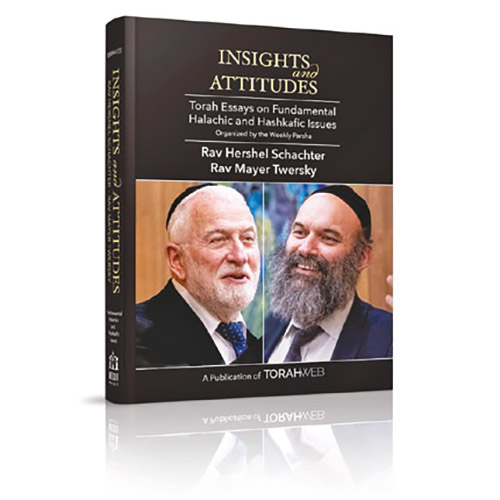
Editor’s note: This series is reprinted with permission from “Insights & Attitudes: Torah Essays on Fundamental Halachic and Hashkafic Issues,” a publication of TorahWeb.org. The book contains multiple articles, organized by parsha, by Rabbi Hershel Schachter and Rabbi Mayer Twersky.
The Avos were commanded to live in Eretz Yisrael. Today we also have this mitzva, and therefore one may only leave Eretz Yisrael when the conditions there are unreasonable. If one simply can not make a living in Eretz Yisrael, and will have to live off of charity, and in chutz laAretz he will be able to make a living, there is no mitzva of ישוב ארץ ישראל, because that is an unreasonable situation.
Likewise, the Talmud says that one who wants to learn Torah in a specific yeshiva in chutz laAretz, and will not be happy at any of the yeshivas in Eretz Yisrael, or one who fell in love with a girl from chutz laAretz and will be brokenhearted if we insist that he may not leave Eretz Yisrael, may leave for the sake of lilmod Torah or lissa isha, because the alternative is simply unreasonable.
In this week’s parasha we read that Avraham Avinu sent Eliezer to chutz laAretz to arrange a shidduch for Yitzchak. Avraham emphasized to Eliezer that under no circumstances may he allow Yitzchak to leave Eretz Yisrael. Why couldn’t Yitzchak leave Eretz Yisrael? Isn’t it the case that for the purpose of a shidduch one is permitted to leave Eretz Yisrael?
The explanation for this is given by Rashi in next week’s sidra. Yitzchak always followed in the footsteps of his father Avraham—maintaining the Masorah. The Torah tells us that he dug the exact same wells that Avraham had dug and called them by exactly the same names that Avraham had. So it’s no surprise that when there was a famine during the lifetime of Yitzchak, he prepared himself to go down to Egypt, just as his father Avraham had done years earlier. On his way to Egypt, Hashem appears to Yitzchak in Gerar and tells him he may not go to Egypt. On the occasion of akeidas Yitzchak, Yitzchak was consecrated as a korban, and if a korban is taken outside of its designated location, it becomes pasul. During the times of the Beis HaMikdash, the designated location for kodshei kodashim was the Azara, while the designated location for kodshim kalim was all of Yerushlayim. In the days of the Avos, the Azara and Yerushalayim had not been consecrated, so the designated location for all korbanos was Eretz Yisrael. Although at the time of a famine Avraham Avinu was permitted to leave Eretz Yisrael, Yitzchak, a consecrated korban, was not.
It is interesting to note that this halacha (that a korban will become pasul if it is removed from its designated location) only takes effect after shechita, which constitutes the first avoda done to the sacrifice. On the occasion of the akeida, no avodos were actually done to Yitzchak. Nonetheless, since the ram which was offered in place of Yitzchak was slaughtered, that shechita was considered as though it had been done to Yitzchak himself. Yitzchak Avinu had the halachic status of a korban on which avodos were done.
Even the avoda of haktara which was performed on the ram was considered as though it had been done to Yitzchak. Towards the end of the tochacha in Parashas Bechukosai, the Torah states that Hashem will remember the covenant that He entered into with Yaakov; as well as His covenant with Yitzchak; and He will also remember His covenant with Avraham (Vayikra 26:42). Rashi on that pasuk quotes from the Tanna’im in the Sifra that the verb “to remember” only appears in connection with Yaakov and Avraham, but not in connection with Yitzchak. The reason for this is that one only has to use his memory to recall someone (or something) who is not in front of him. The avodas hahaktara that was done to the limbs of the ram was considered as having been done to Yitzchak, and Yitzchak’s ashes are piled up on the mizbeiach right before Hashem. Therefore, there is no need to “remember” him.
Avraham Avinu did not misunderstand his instructions regarding the akeida. He was to consecrate his son Yitzchak as a korban olah. Under normal circumstances, the avodos of any olah must be done to that particular korban, and here the malach indicated to Avraham that the avodos done to the ram will be considered as though they had been done to Yitzchak. Yitzchak was not only considered as a korban upon whom the first avoda (of shechita) had already been performed, but even the final avoda (of haktara) done to the ram was also halachically carried over to Yitzchak.
Rabbi Hershel Schachter joined the faculty of Yeshiva University’s Rabbi Isaac Elchanan Theological Seminary in 1967, at the age of 26, the youngest Rosh Yeshiva at RIETS. Since 1971, Rabbi Schachter has been Rosh Kollel in RIETS’ Marcos and Adina Katz Kollel (Institute for Advanced Research in Rabbinics) and also holds the institution’s Nathan and Vivian Fink Distinguished Professorial Chair in Talmud. In addition to his teaching duties, Rabbi Schachter lectures, writes, and serves as a world renowned decisor of Jewish Law.













